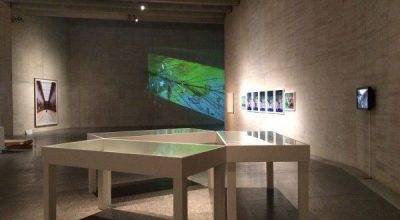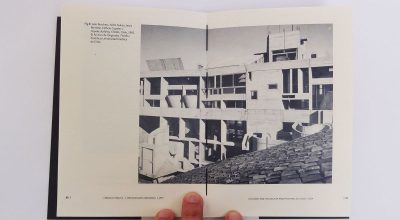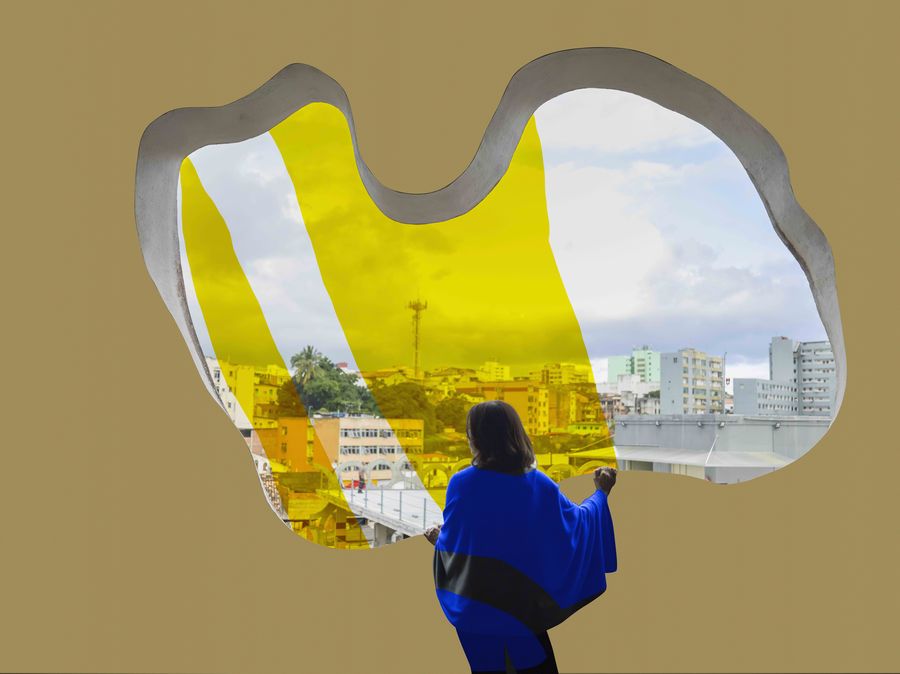
ISAAC JULIEN: LINA BO BARDI—A MARVELLOUS ENTANGLEMENT
“O tempo linear é uma invenção do Ocidente, o tempo não é linear, é um maravilhoso emaranhado onde, a qualquer instante, podem ser escolhidos pontos e inventadas soluções, sem começo nem fim.”
“Linear time is a Western invention. Time is not linear, it is a marvelous entanglement, where at any moment, points can be chosen and solutions invented, without beginning or end.”
A Marvellous Entanglement at the Yale School of Architecture is the latest presentation of British filmmaker Sir Isaac Julien‘s 2019 film installation, which explores the life and work of Italian-Brazilian architect Lina Bo Bardi. Born and raised in Italy, Bo Bardi moved to Brazil after the Second World War. A leading figure in post-war modernism, she left an indelible mark on Brazil’s built environment, designing the Museum of Modern Art in Bahía (1960), the SESC Pompeia (1977-86), the São Paulo Museum of Art (MASP, 1956-68) and the Teatro Oficina (1958), among others.
This latest presentation of the nine-channel video installation is co-organised by the Yale Center for British Art and the Yale School of Architecture. A Marvellous Entanglement was recently presented at the Philadelphia Museum of Art as a pyramid of screens towering above viewers in the Frank Gehry-designed Williams Forum. At the Bechtler Museum of Modern Art in Charlotte, the work was installed closer to the ground in an amorphous path.
Here, in the Yale School of Architecture gallery designed by Paul Rudolph, it is presented in the round. “With Rudolph’s space you have a synergy and a textural interplay between the image and Rudolph’s concrete. There’s a poetry and a sympathy in that conversational sense,” says Julien of the intimate gallery and its evocative materiality.[1]
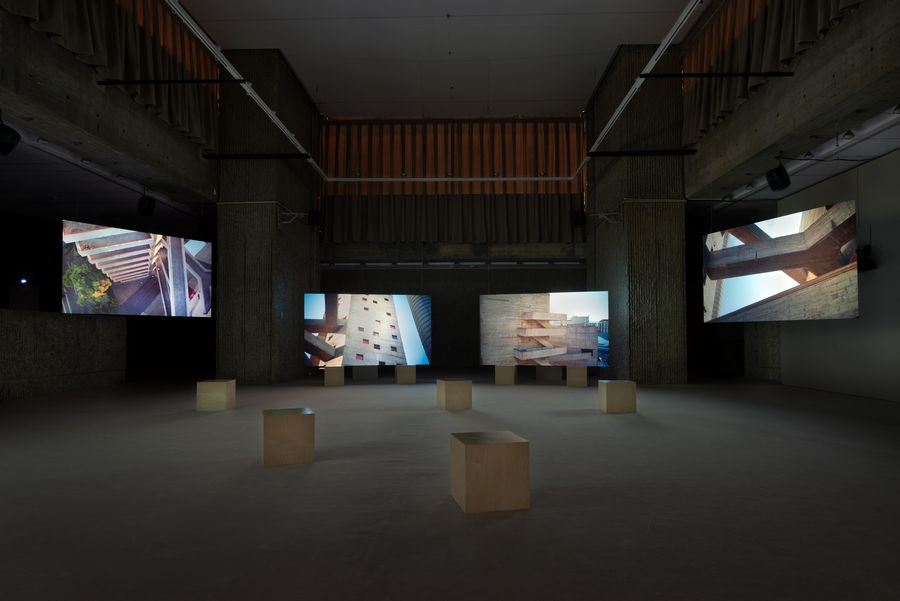
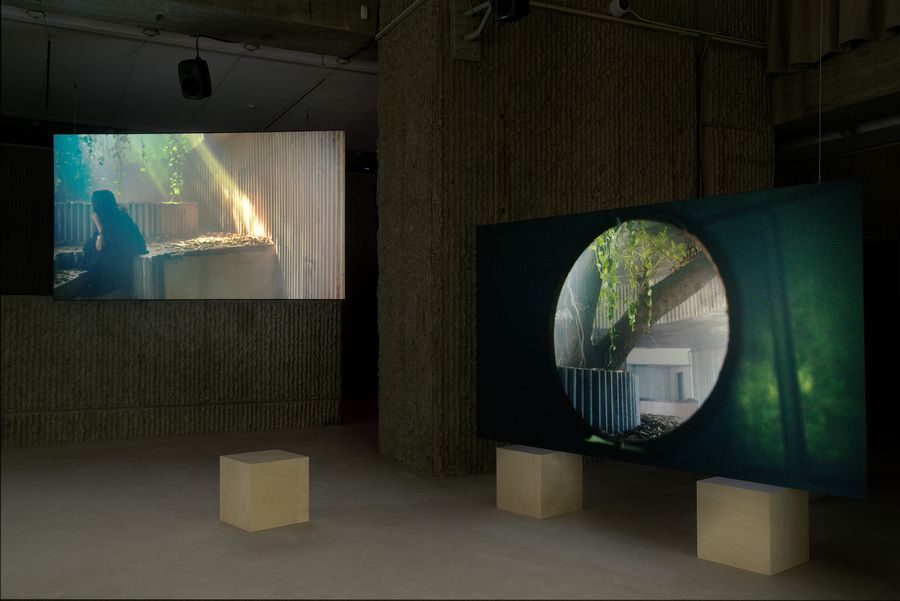
In a conversation at Yale on Monday, October 23rd with architectural historians Esther da Costa Meyer and Sunil Bald, the artist joked that the film was originally going to be called “the ghost of Lina Bo Bardi.”
Julien casts the famous Brazilian actress Fernanda Montenegro and her daughter Fernanda Torres as a mature and younger Bo Bardi. He films spaces ranging from the iconic to the forgotten, balancing time in the architect’s flourishing museums and public spaces with those now abandoned, such as the Coati restaurant in Salvador, Bahía.
The two actresses portraying Bo Bardi coexist in the architect’s spaces, perform the architect’s words, and appear lost in thought. At one point they even listen to a record, as in a gorgeously filmed sequence in São Paulo’s Teatro Oficina, where natural light pours onto the faces of both Linas as they appear to lose themselves in the jovial, soaring vocals of Bahían composer Dorival Caymmi’s Maracangalha. When an archival photograph of Bo Bardi engrossed in music appears onscreen, we experience what might be our most tangible connection to the architect. Caymmi’s melodies and the expressions worn by the three Linas convey an infectious warmth.
While there is no strict beginning or ending to the film, Julien posits Bo Bardi’s encounter with the Brazilian state of Bahía, the photography of Pierre Verger, and the exhibition of Bahían art at the 1959 São Paulo Biennial as her artistic awakening. Speaking with Julien and Bald, Esther Da Costa Meyer notes that for Bo Bardi, the Afro-Brazilian art and culture of Bahía was her single most formative experience: “…it wasn’t Italy and then it was Brazil. It was before Bahía and after Bahía.”[2]
Even when exploring these inflection points in Bo Bardi’s trajectory, the film cautions against a sequential reading of events: “But linear time… there’s a playful beast going there,” Bo Bardi says to Zé Celso (José Celso Martinez Corrêa), the Brazilian stage actor and director who managed Teatro Oficina until his death in 2023. The two appear to rehearse from their scripts, repeating Bo Bardi’s words about how linear time is a Western invention, how time has no beginning and no end.
This is one of several moments where Julien’s attentive and oneiric brand of biographical filmmaking embodies the spirit of Bo Bardi’s words, the entangled nature of time, through playful moments with collaborators.
With a light Brechtian touch, Julien distances the audience from the Montenegrin Bo Bardi by showing the camera as it films the actress and Zé Celso. Celso gives the Lina portrayed by Fernanda Montenegro notes on her delivery: “In a more Italian accent!”, while the crew jumps in to request, “One more for sound! That one was no good.” Um maravilhoso emaranhado, um maravilhoso emaranhado.
The rhythm of ‘entanglement’ in Portuguese and the joyful teasing out of its different resonances by Montenegro and Celso is an enchanting moment in the film, rhythmic and compelling whether you speak Portuguese or not. In what appears to be the crew’s final take, Montenegro finishes her monologue, gesturing at the script and emphatically stating, “…it’s from Lina Bo Bardi. Me.”

Humans, however spectral, are not privileged containers of memory for Julien. Instead, it is the spaces themselves which the film suggests hold the power to trigger joy, reminiscence, and contemplation. In a sequence where the camera darts around SESC Pompeia, Bo Bardi speaks about the need to maintain the sense of play, the sense of joy woven into the urban fabric of this site as she first encountered it.
At MASP, Montenegro and Torres deliver a monologue on two screens directly opposite each other in the gallery. They state that the modern art museum must be a didactic museum, that museums and libraries, containers of public memory, must not be neglected. At another moment, she asserts that “an artist’s freedom has always been individual, but true freedom must always be collective.”
The film engages these themes more directly outside of Bo Bardi’s own words. Archival footage shows civilians being detained and tanks rolling down the street. Simultaneously, the other screens in the gallery show a man sculpting clay into a face which extends from his own arm.
Later, a group of women in white walk down Salvador’s Ladeira da Misericórdia bearing signs which read “Viva Marielle Franco.” In 2019, Franco, a Rio de Janeiro city councilwoman was targeted and killed by far-right militia members for her human rights advocacy, criticism of police brutality, and her status as a queer black woman.
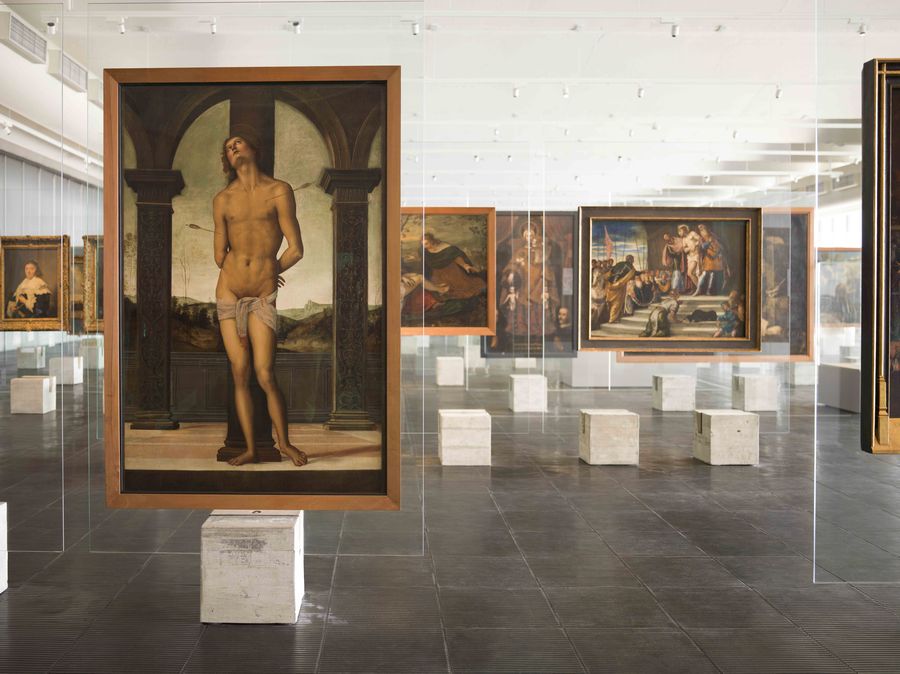
While Bo Bardi’s Casa Coati, the last remnant of a plan to restore the Ladeira from decades ago, is vacant, Julien suggests that her structures are always nearby and attentive to the public’s needs; attentive to the Brazil which has so often been silenced by the government. Moments like these, and those which feature performances from the Balé Folcórico da Bahia and Araká collective, defy the erasure of Afro Brazilians past and present.
The refracted perspective of Julien’s nine-channel installation elicits a feeling of simultaneous remembrance and discovery. As the young and mature Bo Bardi traverse Julien’s frames, each setting triggers a recollection, a faint song. Julien delights in the coalescence of memory, space, and the narratives which are contained and obfuscated by these two in different contexts.
In this film, he insists on the poetry of Bo Bardi’s legacy, on the porosity of her structures with the surrounding urban fabric, and the power of Brazil’s cultural heritage to foster exchange and community in the face of marginalization.
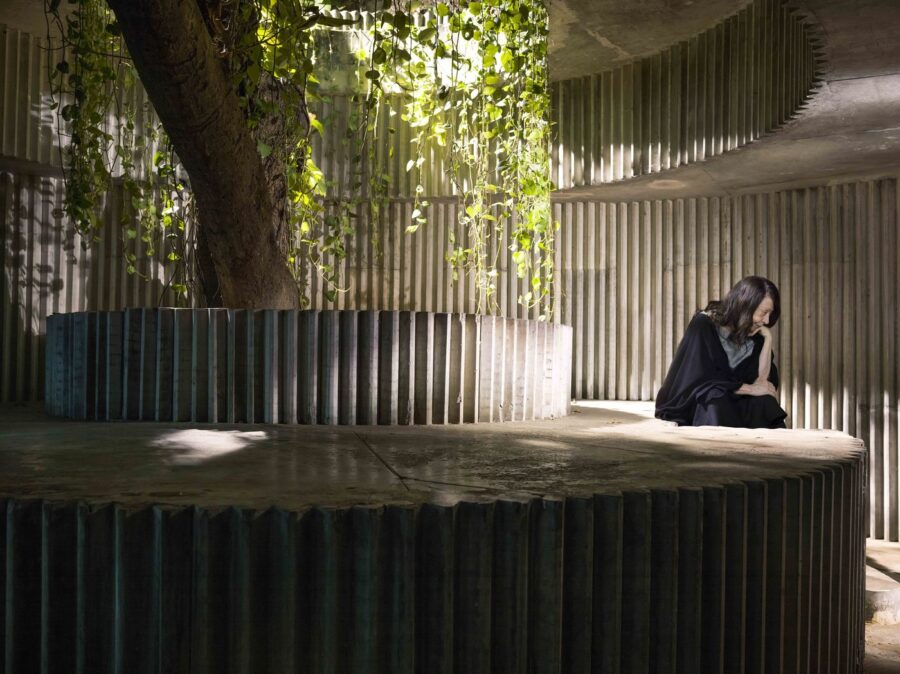
ISAAC JULIEN: LINA BO BARDI—A MARVELLOUS ENTANGLEMENT
August 24, 2023 – December 10, 2023
Yale Architecture Gallery, 180 York Street, New Haven, CT, USA
[1] Isaac Julien in conversation with Esther da Costa Meyer and Sunil Bald, Yale School of Architecture, October 23, 2023.
[2] Esther da Costa Meyer in conversation with Issac Juliena and Sunil Bald, Yale School of Architecture, October 23, 2023.
También te puede interesar
Visita Guiada:artista, Museo, Espectador
Afirmaba Karsten Schubert al amanecer este nuevo siglo que asistíamos entonces a una nueva era dorada del museo. Nuevos museos que abrían sin cesar se codeaban con otros ya existentes mientras asumían un ‘papel…
Arte y Arquitectura:las Nuevas Publicaciones de Arq Docs
Las digresiones de la multiplicidad de disciplinas tildadas de artísticas varían de una dirección a otra, conformando sectores que pueden ser más o menos cerrados. En su modo discursivo, pareciese que cada ámbito disciplinar…
LINA BO BARDI: HABITAT
Entre el 30 de enero y el 10 de mayo de 2020 el Museo Jumex en la Ciudad de México presentó la exposición "Lina Bo Bardi: Habitat", una importante selección de los principales cuerpos...

